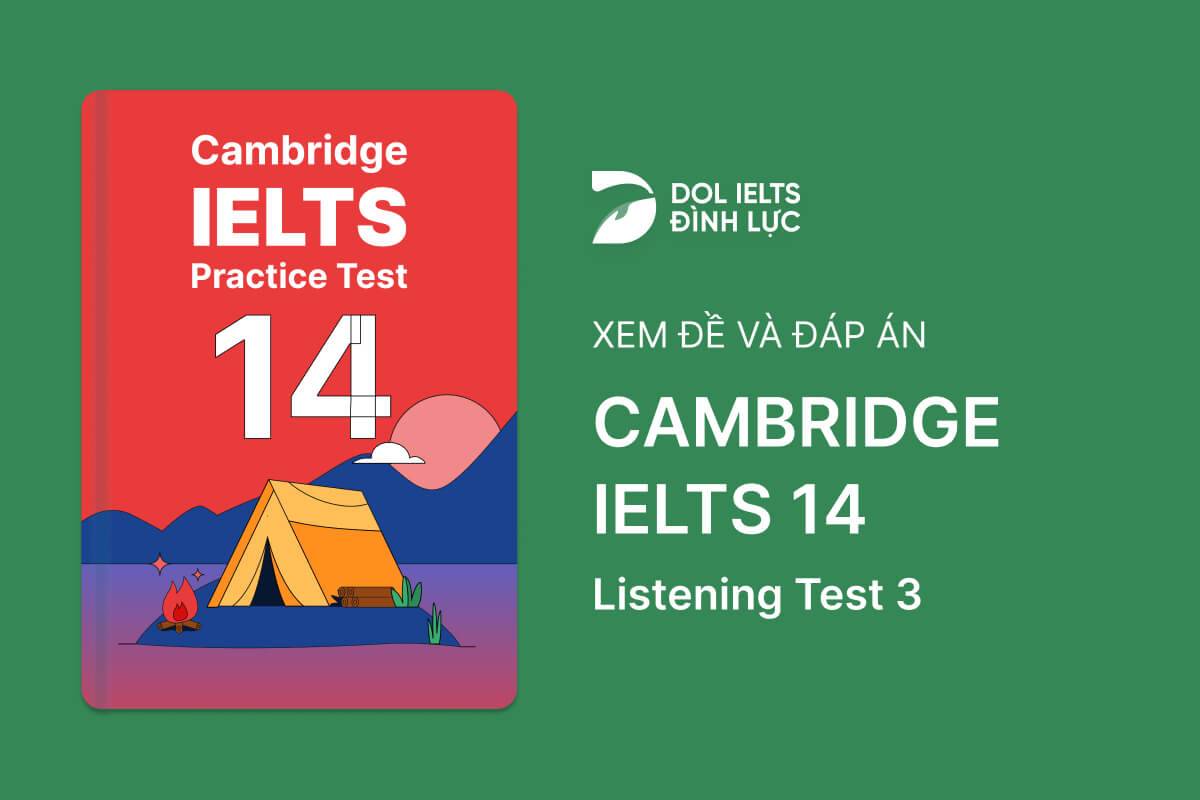Cambridge IELTS 14 - Listening Test 3 With Practice Test, Answers And Explanation
Luyện tập đề IELTS Online Test Cambridge IELTS 14 - Listening Test 3 được lấy từ cuốn sách Cambridge IELTS 14 với trải nghiệm thi IELTS trên máy và giải thích đáp án chi tiết bằng Linearthinking, kèm answer key và list từ vựng IELTS cần học trong bài đọc.
Section
👂️ Bài nghe section 1
weekend beginning February 4th
the
room for talks (projector and1 available)2
area for coffee and an
3
free
throughout4
a standard buffet lunch costs $
per head5
Rooms will cost $
including breakfast.6
The hotel also has a spa and rooftop
7
There’s a free shuttle service to the
8
Wilby Street (quite near the
)9
near to restaurants and many
10
❓ Tapescript section 1
🔥 Đáp án & giải thích section 1
Giải thích chi tiết
 Xác định từ cần điền là noun chỉ tên phòng cụ thể cho việc đàm thoại
Xác định từ cần điền là noun chỉ tên phòng cụ thể cho việc đàm thoại
 Khi bạn nghe "Now can you tell me a bit about what conference facilities you have?"
Khi bạn nghe "Now can you tell me a bit about what conference facilities you have?"
>> "Bây giờ bạn có thể cho tôi biết một chút về những cơ sở hội nghị mà bạn có không?" là biết đáp án chuẩn bị vào.
 Sau đó nghe "So for talks and presentations we have the Tesla room." (để đàm thoại và thuyết trình chúng tôi có phòng Tesla.)
Sau đó nghe "So for talks and presentations we have the Tesla room." (để đàm thoại và thuyết trình chúng tôi có phòng Tesla.)
>> Từ cần điền là "Tesla"
Section
👂️ Bài nghe section 2
❓ Tapescript section 2
🔥 Đáp án & giải thích section 2
Giải thích chi tiết
 Khi bạn nghe "Volunteers can do all sorts of things." (Tình nguyện viên có thể làm tất cả mọi việc, tùy theo khả năng và sở thích của họ.) là biết đáp án chuẩn bị vào
Khi bạn nghe "Volunteers can do all sorts of things." (Tình nguyện viên có thể làm tất cả mọi việc, tùy theo khả năng và sở thích của họ.) là biết đáp án chuẩn bị vào
 Sau đó nghe "...they may be able to give them tips on cooking, or recommend how to plan their budget or how to shop sensibly on their income."
Sau đó nghe "...they may be able to give them tips on cooking, or recommend how to plan their budget or how to shop sensibly on their income."
>>> Một số bạn nghe đến đây sẽ chọn D (shopping). Tuy nhiên, tình nguyện viên chỉ hỗ trợ hướng dẫn cách mua sắm sao cho hợp lý thôi.
>>> Loại D 
 Tiếp theo "They might even do some painting or wallpapering..."
Tiếp theo "They might even do some painting or wallpapering..."
>>> 'Do some painting or wallpapering' là những việc làm cụ thể của 'decorating'
>>> Chọn A 
Section
👂️ Bài nghe section 3
❓ Tapescript section 3
🔥 Đáp án & giải thích section 3
Giải thích chi tiết
 Cần điền một con số vào khoảng trống, số học sinh có trong đội.
Cần điền một con số vào khoảng trống, số học sinh có trong đội.
 Sau khi nghe "You’d better start by giving me a bit of background"
Sau khi nghe "You’d better start by giving me a bit of background"
>>> 'Background' là thông tin nền => Biết đáp án chuẩn bị vào
 Sau đó nghe "...and there are about 50 of them altogether"(có tất cả 50 học sinh)
Sau đó nghe "...and there are about 50 of them altogether"(có tất cả 50 học sinh)
>>> Đáp án là 50 
Section
👂️ Bài nghe section 4
Australian composer: Liza Lim
studied piano and
before turning to composition31
performers and festivals around the world have given her a lot of commissions
compositions show a great deal of
and are drawn from various cultural sources32
her music is very expressive and also
33
festival will include her
called The Oresteia34
Lim described the sounds in The Oresteia as
35
British composers: Ralph Vaughan Williams, Frederick Delius
British composers: Benjamin Britten, Judith Weir
Australian composer: Ross Edwards
festival will include The Tower of Remoteness, inspired by nature
The Tower of Remoteness is performed by piano and
36
compositions include music for children
celebrates Australia’s cultural
37
Australian composer: Carl Vine
played cornet then piano
studied
before studying music38
worked in Sydney as a pianist and composer
became well known as composer of music for
39
festival will include his music for the 1996
40
British composers: Edward Elgar, Thomas Adès
❓ Tapescript section 4
🔥 Đáp án & giải thích section 4
Giải thích chi tiết
 Xác định từ cần điền là noun chỉ 1 nhạc cụ (giống piano) mà Lim đã học trước khi chuyển sang sáng tác.
Xác định từ cần điền là noun chỉ 1 nhạc cụ (giống piano) mà Lim đã học trước khi chuyển sang sáng tác.
 Khi bạn nghe "The first concert will include music by Liza Lim"
Khi bạn nghe "The first concert will include music by Liza Lim"
>>>Đây là ý thứ nhất trong phần "Concert" >>> Đáp án chuẩn bị vào
 Sau đó nghe "As a child, Lim originally learned to play the piano – like so many children – and also the violin"
Sau đó nghe "As a child, Lim originally learned to play the piano – like so many children – and also the violin"
>>> Quá dễ dàng để nhận ra đáp án là: violin 


